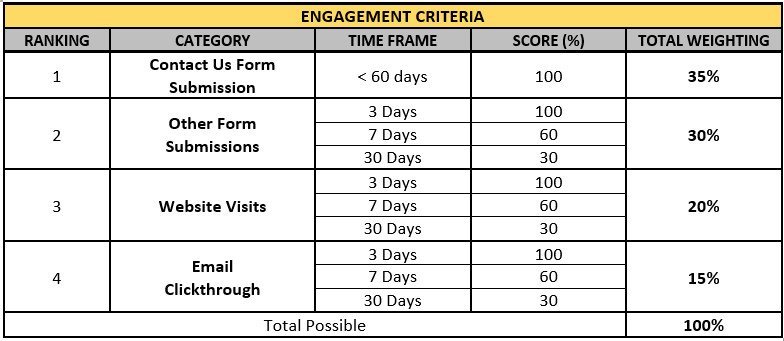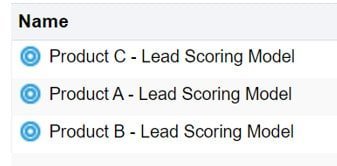In the competitive business environment, effective lead management is crucial for any marketing team’s success. Oracle Eloqua, a leading marketing automation platform, empowers marketers to streamline their lead generation and nurturing efforts, with a particular focus on the powerful Eloqua leads scoring model capabilities. These capabilities can significantly enhance your marketing strategy.
This blog post will delve into the world of Eloqua lead scoring models, guiding you through the essential steps to create a model tailored to your organization’s unique needs. We’ll explore the concept of lead scoring, its benefits, and how to leverage Eloqua’s tools to boost your marketing ROI.

Understanding Lead Scoring:
Lead scoring is an effective technique to assess and prioritize a lead’s interest in a company’s offerings by analyzing their interactions and behaviors. The primary objective is to distinguish the most qualified and engaged leads, enabling the marketing and sales teams to concentrate on prospects with higher conversion potential.
In short, it helps businesses identify the people more likely to become customers. Eloqua provides comprehensive lead-scoring features, empowering us to design personalized lead-scoring models that align with our specific business requirements.
Features of Eloqua Lead Scoring:
Eloqua offers several lead-scoring features to help businesses effectively prioritize and nurture their leads. These features include:
• Behavior Tracking:
Eloqua could track various online behaviors of leads, such as website visits, email interactions, form submissions, and downloads. You could assign a score to each behavior based on its importance.
• Lead Profile Attributes:
Eloqua allows users to define and assign scores based on lead attributes, such as job title, industry, company size, and geographic location.
• Scoring Models:
Users can create custom lead scoring models to assign scores to different behaviors and attributes. In addition, you can also tailor these models to match specific business goals and customer personas.
• Lead Scoring Rules:
Eloqua provides the flexibility to set up rules that trigger specific actions when leads reach a certain score threshold. For example, leads with higher scores could be automatically routed to the sales team for follow-up.
• Integration with CRM:
Eloqua seamlessly integrates with Customer Relationship Management (CRM) systems like Oracle Sales Cloud and Salesforce. Additionally, it ensures that you can share the lead-scoring data between marketing and sales teams.
• Lead Nurturing Workflows:
The platform allows marketers to create automated lead-nurturing workflows based on lead scores. Moreover, leads with higher scores could receive more personalized and targeted content.
• Real-time Scoring:
Eloqua provides real-time scoring updates, ensuring lead scores reflect the most recent interactions and behaviors.
• Reporting and Analytics:
Eloqua offers robust reporting and analytics tools to track the effectiveness of lead-scoring models and make data-driven adjustments.
Defining Scoring Criteria:
Certainly! Let’s explore how to define scoring criteria that align with your business goals and customer personas. To begin with, it’s crucial to understand that aligning your scoring criteria with these aspects is vital for effective lead management. The lead scoring process in Eloqua typically involves the following steps:
Step 1: Business goals.
First and foremost, consider your business goals. What are your goals for your marketing endeavors? Are you looking to increase sales in a specific product line or expand into a new market? These objectives will shape the scoring criteria.
Step 2: Buyer personas.
Next, examine your customer personas. Buyer personas represent your perfect customers in a fictional form. Think about what traits and behaviors make a lead a good fit for your business. For instance, if you’re a B2B software company, a persona might include attributes like company size, industry, and job title.
Step 3: Scoring criteria.
Now, let’s establish specific criteria. Determine which behaviors and attributes are most relevant to your goals and personas. For example, if your goal is to sell more enterprise-level software licenses, leads from larger companies might receive higher scores.
Additionally, assign weights to each criterion based on their importance. Some criteria may carry more weight than others in predicting a lead’s likelihood to convert.
Oracle Eloqua employs two distinct sets of criteria to assess a lead:
- Profile Criteria: These are the attributes or characteristics of a lead that are used as part of the Eloqua lead scoring model to assess the lead’s fit or suitability for our products or services.

- Engagement Criteria: These are the actions and behaviors that signal a lead’s interest or engagement. Additionally, this may include actions like email opens, link clicks, website visits, form submissions, etc.

Step 4: Assigning Point Values
Each action/behavior or the right profile fit is assigned a specific point value. Allocate more points to the high profiles showing higher engagement or interest than less significant interactions.

Step 5: Tracking and Accumulating Scores
As leads interact with marketing campaigns, Eloqua tracks their activities and awards rating based on both Profile & Engagement fit according to the defined scoring rules. It will combine both profile & engagement score and these accumulated scores are associated with each lead’s profile.
Step 6: Monitor and adjust score
Lastly, it’s essential to monitor and adjust your scoring criteria continuously. Market dynamics change, and so should your criteria. Regularly review and refine your scoring model to ensure it stays aligned with your business goals and customer personas. This iterative approach will help you maintain the effectiveness of your lead-scoring strategy over time.
Creating Eloqua Lead Scoring Models:
Eloqua allows us to create multiple scoring models based on different criteria. For instance, we could have separate scoring models for leads interested in specific products and those engaging with each respective product’s content.

Lead Qualification Threshold:
Establish score thresholds that indicate a lead’s readiness to move forward in the sales funnel. You can use these thresholds to categorize leads as “cold,” “warm,” or “hot.” When a lead’s score surpasses this threshold, it triggers a notification to the sales team, indicating that the lead is likely ready for personalized follow-up.
Below is the screenshot showing the threshold settings of Profile & Engagement in the Lead Scoring Model in Eloqua.

Lead Routing & Nurturing:
After scoring the leads, we can use Eloqua to automate lead routing. The leads meeting specific criteria can be automatically assigned to the appropriate sales representatives or added to specific nurture campaigns.
For leads that are not yet sales-ready, set up lead nurturing campaigns in Eloqua to engage and educate them until they meet the scoring thresholds.
Conclusion:
In conclusion, Eloqua lead scoring model capabilities offer a powerful toolkit for marketers to elevate their lead management strategies. Lead scoring is not a static process. It should be continuously reviewed and refined based on the feedback from the sales team and the actual conversion rates of scored leads. We may need to adjust scoring criteria and thresholds over time to ensure they align with our evolving business goals.
Optimize Your Lead Scoring with Marmato Digital: Elevate Your Eloqua Experience!
As you delve into the world of Eloqua’s lead scoring, remember that it’s not just about assigning numbers; it’s about unlocking valuable insights, optimizing resource allocation, and ultimately supercharging your marketing efforts. With a well-defined Eloqua lead scoring model, you’re better equipped to focus your resources on high-potential leads, foster collaboration between sales and marketing teams, and achieve a more substantial return on investment in your marketing endeavors.
Our expert team is here to empower your marketing strategy by leveraging the full potential of Eloqua’s lead-scoring capabilities. Let us help you fine-tune your scoring model, implement best practices, and drive more qualified leads to your sales team.
Get in touch with us today to unlock the true potential of Eloqua and take your lead scoring to the next level. Your success is just one click away!
Subscribe to blogs
Get our latest blogs directly to your inbox.

